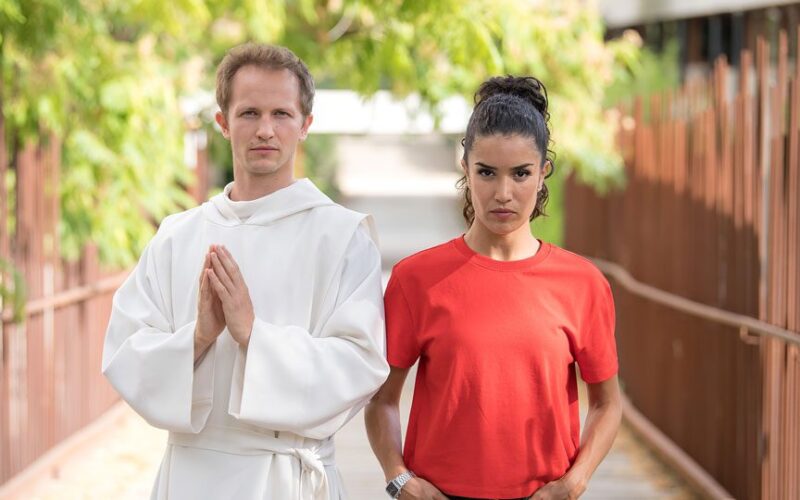Under Law and Grace
I approached Under Law and Grace with the natural skepticism of an American Christian of a certain age who has, with painfully few exceptions, never seen religion done particularly well on television.
The show’s pitch promises a partnership between an Atheist cop and a novitiate monk. The reservation most easily voiced is that this would be an opposites-attract romance. The less obvious but deeper fear is that the cards would be stacked all on one side. If it was from the point of view of the religious, the cop would be someone who was hostile to religion while failing to acknowledge the obvious superiority (at least in praxis) of those whose action is informed by faith — something like God’s Not Dead: The Police Files. Or the person of faith would be portrayed as a rube or an idiot, hopelessly out of touch with the modern world. An anachronism or an Orientalist “other” for the mainstream to be enticed and thrilled by but having no real value other than as an object of scrutiny.
I was able to preview the first three episodes thanks to MHzChoice which is streaming the French police procedural beginning in June 2023. Although it could eventually turn into a cliched shadow of its best self, the early returns are quite promising. Clément (Mathieu Spinosi) is neither a savant nor a genius. He doesn’t so much see what others miss as act in different ways when he sees what everyone else sees. Elli (Sabrina Ouazani) starts the first episode by noting that organized religion gives her the creeps, but being aware of one’s own prejudices makes her a far more interesting subject than would be a conventional intolerant bigot.
Elli is unmarried, making the shadow of a potential romance never far from the realm of possibility. But the show goes to great lengths to give her a life that revolves around something other than the lack of a partner. She is a de facto mom to three younger sisters, making her seem older than she is. And she has a male partner, Franck, who has his own romantic entanglements. In one of the show’s best exchanges, Clément prods Elli not about her lack of a love relationship but her lack of a best friend with whom she can confide and share her burdens. “Will you be my best friend?” she asks. “With pleasure,” he replies.
The show gets major props for even trying to map out different kinds of relationships that are possible between men and women. Then again, as someone who (eventually) married his “best friend” the loaded nature of this exchange was not lost on me. But it’s not lost on the characters, either, which is what makes the show click. Friendship is a fountain from which flows a genuine desire for another’s good — which is a good way of thinking about the differences between agape and eros.
Elli seems a little young to be a detective, but her relative youth and Arabic surname (Taleb) also keep the character from coming off as too cynical, too set in the ways of the establishment. Conversely, Clément’s association with an ancient religious order makes him seem older than he is. I think that dynamic is important because in any time of detective/assistant relationship the power dynamics make mutual respect difficult.
Under Law and Grace works best when the characters are direct and honest with each other. It is refreshing and encouraging to see a professional relationship between any male and female character — much less a relationship between a religious and non-religious person — that is grounded in mutual respect and a willingness to acknowledge the positive qualities in the other. Tired of summer reruns? Why not give a foreign language show a shot? Subscriptions to MHz currently run for about $8 per month after a free trial.

